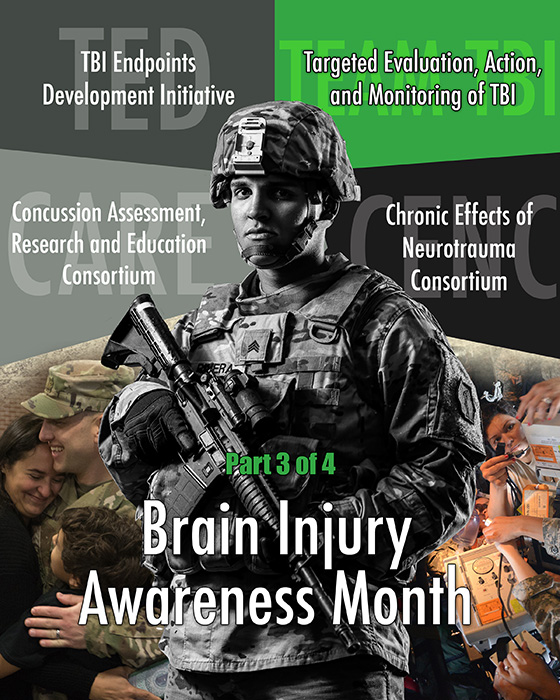Research Supporting a Lifetime of Brain Injury
Part 3 of 4
As the Soldier faces his next mission, he is both physically and mentally prepared for what is to come as his unit moves into a conflict in a dense urban environment. Over the years, he has moved through the ranks of the U.S. Army, and now relies on his training to execute his mission and to lead his team to face threats – both known and unknown. Ensuring the health of this Soldier is paramount to the lethality of the force. Medical research is the driving force behind protection for our Service Members' every possible medical need, including fostering strong psychological health and addressing traumatic brain injury.
JOINT PROGRAM COMMITTEES
The Congressionally Directed Medical Research Programs originated in 1992 through Congressional appropriation funding targeted towards specific medical research areas. These research areas have since grown to include over 30 programs from kidney and ovarian cancer to spinal cord injury and hearing restoration research programs.
The Psychological Health and Traumatic Brain Injury Research Program was established by Congress in 2007 in response to psychological health and TBI issues experienced by deployed Service Members in Iraq and Afghanistan. Currently the CDMRP provides support to the Joint Program Committees – Military Operational Medicine Research Program, the Combat Casualty Care Research Program and the Clinical and Rehabilitative Medicine Research Program – and the Defense Health Agency in managing the Psychological Health/TBI Research Program appropriations.
"The JPCs provide the strategy, and CDMRP coordinates the development and release of funding opportunities. The JPCs leverage the knowledge and materiel products from those awards and use them to benefit our Service Members, veterans, and the public," said Dr. Dwayne Taliaferro, CDMRP health sciences program manager.
TEAM TBI
Dr. David Okonkwo is the principal investigator at the University of Pittsburgh for the Targeted Evaluation, Action, and Monitoring of Traumatic Brain Injury, or TEAM-TBI, project that was funded through the PH/TBIRP appropriation. TEAM-TBI is a clinical trial for adults with a history of TBI that is aimed at improving the ability to diagnose and treat TBI.
"The ultimate goal of the TEAM-TBI initiative is to generate clinical practice guidelines to address chronic consequences of TBI," said Okonkwo. "Specifically, the goal is to establish diagnostic criteria for TBI clinical profiles, such as cognitive, vestibular and sleep, disorders, confirm efficacious targeted therapies, and provide deployable protocols and technology for large-scale cost-effective diagnosis and management."
TEAM-TBI is a new approach to TBI clinical trials, using brain imaging techniques. Adults with a history of TBI and with symptoms related to TBI are enrolled in the study, and begin with a three to four day comprehensive evaluation to assess the patients' extent of injury. After this initial assessment, individualized treatment recommendations are made, and the patient is given a range of specialized treatment, working with experts in the different categories such as sleep, vision, memory and mood. The participants return for a repeat evaluation, using the brain imaging techniques that look at the anatomical structure of the brain and how it may have changed. This information will help to determine what progress was made with the specialized treatment therapy.
Okonkwo described how this research can help a Service Member who experienced a TBI and may be dealing with ongoing issues related to the original injury.
"The TEAM TBI approach teases out those seemingly unrelated and complex issues into their principle components. The team then develops targeted interventions that could allow a Service Member to return to active duty and still be effective," he said.
"TEAM TBI is a unique, comparative effectiveness study that seeks to confirm efficacious targeted therapies for TBI and also provide deployable protocols and technology for large-scale, cost-effective diagnosis and management of mild TBI using personalized and precision medicine," said Dr. Marcello Pilia, CCCRP assistant portfolio manager for the Neurotrauma portfolio.
Pilia shared that a total of 94 patients have been enrolled in the TEAM-TBI clinical trial, which includes a TEAM-TBI Toolkit for the six-month treatment.
"Interventions administered through this novel telemedicine treatment modality can include activity and sleep monitoring, personal coaching, and mindfulness and cognitive training," said Pilia.
RESEARCH PROVIDING RESULTS
"In the TEAM-TBI pilot study, we confirmed that a comprehensive clinical assessment protocol could inform a multi-disciplinary adjudication process to confirm specific TBI clinical diagnoses," said Okonkwo. "Targeted interventions in an individualized treatment plan produced success in reducing overall symptom burden. Furthermore, we confirmed success in treating multiple specific TBI clinical profiles such as sleep disorders, oculomotor disorders and cognitive disorders.
"The impact of the TEAM-TBI model on addressing specific TBI clinical diagnoses is the subject of several peer-reviewed manuscripts in varying stages of publication," he added. "We anticipate public dissemination of TEAM-TBI data through several channels in 2018."
As the Army major completes the mission and returns home, healthcare support will continue. Army Medicine is focused on injuries that both can and cannot be seen. Strategic partnerships throughout the DOD will continue working towards supporting our Service Members on and off the battlefield. Over the years, this officer will move through the ranks to become a senior leader where his experiences will be the guidance for younger Soldiers, and medical research will pave the way for future healthcare solutions.
 An official website of the United States government
An official website of the United States government
 ) or https:// means you've safely connected to the .mil website. Share sensitive information only on official, secure websites.
) or https:// means you've safely connected to the .mil website. Share sensitive information only on official, secure websites.



